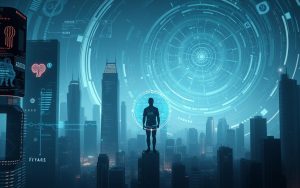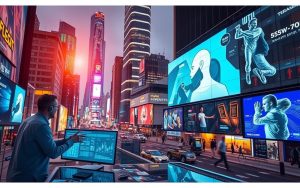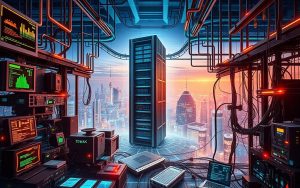Smartphones and smart homes are now part of our lives. They’ve changed how we live and interact. This makes us wonder about our connection to these new tools.
Technology has grown fast, bringing both good and bad. It makes life easier but also affects our mental health and how we connect with others.
This piece looks at how tech is vital in today’s world. It also talks about the downsides of relying too much on digital tools. We’ll see the good and the bad of our tech use.
We’ll explore different views on our tech use. Is it really needed, or are we too dependent on it?
The Central Debate: Necessity Versus Dependence
Our use of technology is a big topic today. It’s clear that digital tools are a big part of our lives. But, is it because we really need them or because we’re too used to them? This question is at the heart of many discussions about technology.
Understanding the Terms: What Makes Something a Necessity?
An essential need definition means things we must have to live and function. Throughout history, these have been things like food, water, and shelter. They keep us alive and let us do basic things.
Nowadays, technology is changing what we see as necessities. Some say things like the internet and phones are now essential. They help us work, learn, get healthcare, and stay connected in ways we couldn’t before.
The table below shows how old necessities compare with new tech ones:
| Traditional Necessities | Modern Technological Equivalents | Survival Critical |
|---|---|---|
| Clean water access | Digital communication tools | Yes/No |
| Basic shelter | Internet connectivity | Yes/No |
| Nutritional food | Smartphone devices | Yes/No |
| Healthcare access | Telemedicine platforms | Yes/Partial |
How Dependence Differs from Essential Need
Dependency on technology is different from needing it. It’s about relying on it too much, even if we don’t need to. This is clear when we see how people act when they can’t use their phones.
For example, some people get anxious without their phones. This shows they’re dependent on technology, not just needing it. It’s like other dependencies, like drugs or alcohol.
Here’s what sets necessity apart from dependence:
- Necessities are about survival; dependence is about comfort or habit
- Not having necessities hurts us physically; not having technology hurts us mentally
- Necessities have few alternatives; technology has many ways to access it
This technology necessity vs dependence debate is complex. What one person needs, another might just be used to. It depends on their life and needs.
Is Technology a Necessity in Daily Life?
Today, we can’t imagine life without digital tools. From waking up to checking news before bed, technology is everywhere. It makes us wonder if these tools are now essential.

Indispensable Technologies for Modern Living
Some technologies are so key to our lives that without them, everything would change. They are now seen as vital for living today.
Communication Tools: Smartphones and Messaging Apps
Smartphones are more than just phones. They are:
- Digital wallets for money
- GPS for finding places
- Organisers for our lives
- Quick ways to get help
Messaging apps like WhatsApp and Signal have changed how we stay in touch. They make it easy to talk to people anywhere in the world.
Access to Information: Internet and Search Engines
The internet is a must for many daily tasks. It answers our questions fast, from the weather to health issues.
Search engines like Google are our go-to for information. As one expert says:
“The internet is like the world’s biggest library. Search engines help us find answers without needing old books.”
This technology helps us learn, make decisions, and even pick what to eat or where to go.
Scenarios Where Technology Becomes Critical
Technology is vital in emergencies. It keeps us safe and helps in times of need.
Emergency Services and Disaster Response
Emergency systems today rely on technology. It helps find people in disasters and sends alerts fast.
| Technology | Emergency Application | Impact |
|---|---|---|
| GPS Tracking | Locating victims in remote areas | Reduces search time by 60% |
| Emergency Alert Systems | Mass notification during crises | Warns populations within minutes |
| Drone Surveillance | Assessing disaster zones | Provides real-time damage assessment |
These systems show how technology is a must in emergencies.
Healthcare Advancements and Telemedicine
Medical tech has changed how we get care, thanks to telemedicine. It lets people get help from anywhere.
- It helps those in remote areas get specialist care
- It lets the elderly or those who can’t move easily get medical help
- It lets us monitor health conditions with devices
- It spreads health info fast during outbreaks
These advances show how technology saves lives. It’s now a key part of healthcare.
The Rise of Technological Dependence
Our relationship with technology has changed a lot. It’s not just useful anymore. Now, our devices and platforms feel like part of us. This section looks at why we’re so dependent on technology.
Psychological and Social Factors Driving Reliance
Technology doesn’t just meet our needs; it shapes our behaviour. Digital platforms are designed to keep us coming back. This can lead to a strong psychological need for technology.
Addictive Design in Software and Platforms
Apps use psychology to keep us hooked. Features like infinite scrolling and push notifications make us feel good. This keeps us checking our devices all the time.
Waiting for notifications can make us anxious. It’s like feeling nervous on your wedding day. This shows how much these design choices affect us.
Social Norms and Peer Pressure
Being always connected is seen as normal today. The fear of missing out (FOMO) makes us keep using social media. Feeling left out if we’re not online is common.
Many feel anxious without their phones. This is called nomophobia. Research shows 66% of people feel this way.
Economic and Structural Reinforcements
There are also economic reasons for our tech dependence. The way society works makes it hard to avoid technology.
Digitalisation of Work and Education
The job world has changed a lot. Now, we use digital tools for work and school. This makes knowing how to use technology essential.
Being good with technology is now a must for school and work. It’s not just a nice skill anymore.
Consumer Culture and Market Forces
Technology companies keep pushing for new things. They make old tech seem outdated. This creates a need for the latest gadgets.
Ads make us think we need the newest tech. This makes it seem like a must-have, not a luxury.
These economic and psychological factors create a cycle of tech dependence. It’s hard to break free from this cycle.
Benefits of Technological Integration
Technology’s good sides are just as important as its bad. It has changed how we work, talk, and solve problems. These changes are key to today’s society.

Efficiency and Convenience in Everyday Tasks
Technology has made daily tasks easier. Online banking lets you manage money from anywhere, saving time. Shopping online means fast delivery.
Navigation apps have changed travel. They give real-time traffic updates and the best routes. Smart homes make life easier with automated tasks.
These changes save a lot of time and effort. People can do more with less work. This is a big plus of technology in our lives.
Innovation and Progress in Society
Technology drives society forward. It has led to big advances in medicine and education. Online learning has opened doors to knowledge for many.
It has also brought people together worldwide. Environmental tech helps us tackle big challenges. Research shows it’s changing how we learn.
Technology also boosts the economy and creates jobs. New industries and digital changes in old ones drive growth. This improves life in many ways.
| Technology Area | Efficiency Benefits | Innovation Impact |
|---|---|---|
| Digital Finance | Instant transactions, reduced paperwork | Fintech solutions, financial inclusion |
| Healthcare Technology | Faster diagnostics, remote monitoring | Personalised medicine, research acceleration |
| Educational Tools | Accessible learning materials | Global classroom connectivity |
| Smart Infrastructure | Energy optimisation, traffic management | Sustainable city development |
Technology has made society better in many ways. It’s not just about convenience. It’s about progress for everyone. Seeing the good in technology helps us understand its value.
Drawbacks and Risks of Over-Dependence
Technology brings many benefits, but our growing use of digital systems creates big risks. The ease of modern devices has hidden costs that harm our health and society.
Privacy Concerns and Data Security Issues
Every time we go online, our digital trail grows. Companies gather lots of personal info without always telling us how they’ll use it.
Data breaches are getting more common, putting our private info at risk. These problems show the downsides of tech when security can’t keep up with new tech.
“The price of digital convenience is often paid in personal privacy, creating a permanent record of our most intimate moments.”
The table below shows common data security threats and their effects:
| Threat Type | Frequency | Potential Impact | Prevention Difficulty |
|---|---|---|---|
| Phishing Attacks | Very Common | Identity Theft | Medium |
| Ransomware | Common | Data Loss | High |
| Data Breaches | Increasing | Financial Damage | Very High |
| Surveillance | Constant | Privacy Erosion | Extreme |
Mental Health Impacts: Anxiety and Isolation
The link between mental health and technology is complex. Always being connected can make us feel anxious and stressed.
Many feel nomophobia – fear of being without a phone. This fear grows when we can’t check messages or use digital services.
Being too connected can also lead to feeling lonely. Studies show too much screen time can make us feel sad and lonely.
Vulnerability to System Failures and Cyber Attacks
Our world is more connected, but this makes it vulnerable. Things like power grids and healthcare networks rely on digital systems.
Cyber security risks are getting worse as tech gets more integrated. A single weak spot can harm many people at once.
Technical failures are also a big risk. When systems crash, it can stop businesses and emergency services. We have fewer backup plans when tech fails.
As cyber attacks get smarter, we must stay alert. Both people and companies need to focus on keeping data safe.
Balancing Technology Use: Strategies for Healthy Engagement
Finding a balance with technology is key. It’s about using it wisely and not too much. We need personal rules and wider society support to use tech well.
Digital Detox and Mindful Usage Practices
Regular digital detox is a strong way to balance technology use. It helps us know when to stop using devices. This stops us from getting too caught up in screens.
Using tech mindfully means setting times to check devices. Experts say turn off notifications when you’re working or with friends. It helps us stay focused.
Simple habits can cut down on our tech use:
- Make device-free areas for meals and family time
- Leave phones at home when you go out or exercise
- Use phone features to limit app time
- Ask yourself if you really need to check something now
These digital detox steps help us pay attention to the world around us. They keep us connected while using tech wisely.

Policy and Educational Approaches
Rules and education are also vital for healthy tech use. Many places have no-phone zones to help us stay present.
Schools teach kids how to use tech right from the start. They learn both how to use devices and the effects of too much screen time.
Workplaces can help too. They might have email-free nights or days without meetings. This helps employees avoid tech overload.
Places like cafes and restaurants going phone-free show us how community rules can help. These efforts, along with personal actions, create a better digital world.
Government support for digital wellness education is also important. It helps us use tech’s good sides while avoiding its bad ones.
Conclusion
Technology plays a big role in our lives, both good and bad. Companies like Apple and Google are key for staying in touch and getting work done. This shows how complex our relationship with digital tools is.
Looking back, new tech doesn’t always make life better. Sometimes, it brings new worries. This is a key point in understanding our tech use.
Finding balance is essential. Using tech wisely and making policies can help. We need to make sure tech helps us, not the other way around.
The way we see technology needs to change. A shift in how we use devices could change the game. Microsoft is already working on ethical AI, showing a path forward.
Our journey with technology is ongoing. We must use its benefits while avoiding too much reliance. This is both our biggest challenge and chance.
FAQ
What is the difference between technology being a necessity and a dependence?
A necessity is something we need to survive, like food or a home. Today, technology is seen as a necessity for getting information and staying in touch. Dependence, though, is when we can’t stop using technology, even when it’s not needed. This can lead to feelings of anxiety when we can’t use it.
In what ways has technology become indispensable in daily life?
Smartphones and messaging apps are key for keeping in touch with friends and family. The internet gives us quick access to information for school, work, and making decisions. It also helps in healthcare and emergency services, saving lives in remote areas or during emergencies.
What factors contribute to dependence on technology?
Our brains get hooked on technology because of its addictive design. Social pressure and the need to stay connected also play a big part. Work and education have moved online, making technology essential for our jobs and studies. The push to buy the latest gadgets also adds to our dependence.
What are the benefits of integrating technology into society?
Technology makes our lives easier and more efficient. It helps us with online banking, shopping, and finding our way around. It also drives innovation in healthcare, education, and communication, boosting the economy and improving our quality of life.
What risks are associated with over-dependence on technology?
Being too reliant on technology can lead to privacy issues and data breaches. It can also harm our mental health, causing anxiety and feelings of isolation. Society faces risks from system failures and cyber attacks, which can disrupt essential services.
How can individuals and society manage technology dependence?
People can take breaks from technology, like not using phones during meals or while driving. Governments can create no-phone zones in public places. Schools can teach digital literacy to help us use technology wisely.
Is technology considered a modern necessity?
Yes, technology is seen as a necessity today because it helps us communicate, access information, and get critical services. But, we need to be careful not to overuse it. It’s important to find a balance to enjoy its benefits while avoiding its risks.







